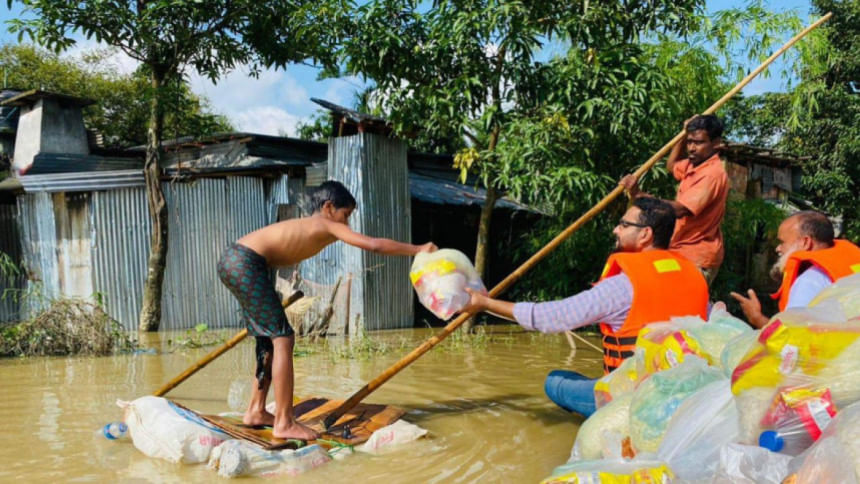The world needs humanitarians more than ever

When crises unfold, humanitarians are the first to step forward.
In Rasulpur village, Lakshmipur, waist-high floodwater has engulfed the road, blurring the lines between ponds and homes. The air is thick with the smell of wet earth and soaked clothes. Through it all, a young woman in a red vest wades carefully, calling out to families, checking if anyone needs to be evacuated, and assessing where urgent help is needed.
That woman is Suchana from the same flooded village. She is a trained community volunteer with the Bangladesh Red Crescent Society (BDRCS). She has been working for months, helping her own community, which is still recovering from last year's eastern region floods. Like her, thousands of trained volunteers of BDRCS work through floods, cyclones, fires, landslides, cold waves, and heat waves, including in Cox's Bazar refugee camps.
"I love helping and supporting people in need," Suchana says. "Most of the time, with even the smallest help, they can fight back and rebuild. I have seen people survive, recover and live again. And that's my inspiration."
She remembers a mother and her two children she helped evacuate during last year's unprecedented floods in south-eastern Bangladesh.
"They cried as we evacuated them, but the next day they smiled when we brought food and drinking water for them. That smile has stayed with me," added Suchana.
Like Suchana and other Red Crescent volunteers, we have millions of humanitarians worldwide, many of whom stay unseen and unrecognised, but in moments of danger step forward to protect lives, often risking their own.
The need for them is growing. In 2024, the United Nations estimated that 305 million people worldwide, including 24.5 million in Bangladesh alone, would require humanitarian assistance.
Today, the strong early warning systems save millions of lives, but the courage humanitarian workers require remains the same. From the Covid-19 pandemic to devastating cyclones and fires, humanitarian teams in Bangladesh have faced extraordinary challenges. Unfortunately, these unsung heroes do not always come back safe and sound.
Globally, the risks to humanitarian workers are rising. By mid-July 2025, at least 143 humanitarian aid workers have been killed in 25 countries. Last year was the deadliest on record—377 lives lost, including 32 Red Cross and Red Crescent staff and volunteers. In 2023, at least 280 aid workers were killed—a 137 percent increase from 2022. More than 95 percent of those killed were local humanitarians who received far less media attention than internationals. Many more were injured, kidnapped, attacked, or detained.
Beyond physical dangers, humanitarians increasingly face risks from misinformation and disinformation. False narratives, sometimes baseless rumours about aid distribution, spread rapidly on social media and in communities. During the pandemic response in Bangladesh, aid workers were sometimes denied entry to communities due to false information and fears about vaccines. In cyclone-affected areas, rumours that evacuation shelters were unsafe delayed the movement of the at-risk community to higher ground. Such misinformation erodes trust, delays lifesaving assistance, and in some cases incites violence against aid workers. Combating this "information crisis" has become as critical as providing aid itself. Awareness campaigns can help address these difficulties.
These hostile situations also affect aid workers both physically and mentally. In Bangladesh, we remember the Red Crescent volunteers who arrived within five minutes of the fighter jet crash at Milestone School and College in Uttara. The tragedy left one IFRC volunteer in need of psychosocial support. Shah Alam, a Red Crescent volunteer with the Cyclone Preparedness Programme (CPP), died in May 2020 while evacuating people during Cyclone Amphan.
There is International Humanitarian Law (IHL) to protect aid workers and civilians, but laws mean little if not enforced, upheld, and respected. We must confront intentions to normalise attacks on humanitarian workers and hold those responsible.
By promoting respect for international humanitarian law and the humanitarian principles, humanitarian diplomacy leverages diplomatic channels to encourage decision-makers and opinion leaders to act in the interest of people with humanitarian needs and protect humanitarian workers.
On this World Humanitarian Day, under the themes "Protect Humanity" and "Act For Humanity," let us remember that humanitarians are not just a resource to be deployed; they are people with families, feelings, dreams, and hopes, choosing to serve others in their hour of greatest need. The world needs humanitarians, including volunteers, more than ever, and the international community needs to ensure that mechanisms are in place to protect them.
Alberto Bocanegra is head of delegation at International Federation of Red Cross and Red Crescent Societies (IFRC) in Bangladesh.
Views expressed in this article are the author's own.
Follow The Daily Star Opinion on Facebook for the latest opinions, commentaries and analyses by experts and professionals. To contribute your article or letter to The Daily Star Opinion, see our guidelines for submission.

 For all latest news, follow The Daily Star's Google News channel.
For all latest news, follow The Daily Star's Google News channel. 



Comments